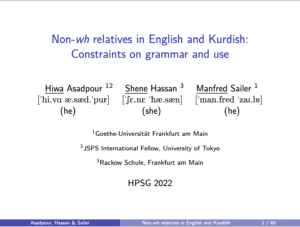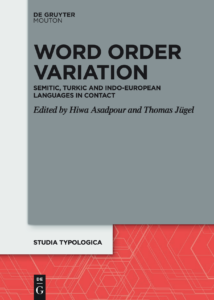 Hiwa Asadpour, Shene Hassan & Manfred Sailer sketch an analysis of English and Sōrānī Kurdish non-wh relatives in their talk at HPSG 2022 (July 29-31, 2022) on “Non-wh relatives in English and Kurdish: Constraints on grammar and use.” In both languages, there is variation between bare relatives and relatives introduced by a function word, that and ka respectively. The authors discuss some aspects of social meaning that is attached to the choice between the bare and the non-bare variant. Continue reading Asadpour et al. at HPSG 2022
Hiwa Asadpour, Shene Hassan & Manfred Sailer sketch an analysis of English and Sōrānī Kurdish non-wh relatives in their talk at HPSG 2022 (July 29-31, 2022) on “Non-wh relatives in English and Kurdish: Constraints on grammar and use.” In both languages, there is variation between bare relatives and relatives introduced by a function word, that and ka respectively. The authors discuss some aspects of social meaning that is attached to the choice between the bare and the non-bare variant. Continue reading Asadpour et al. at HPSG 2022
Monthly Archives: July 2022
Tutor*in gesucht: Intro Linguistics (WiSe 22/23)
Note: The position has been filled
Für das Wintersemester 2022/23 ist in der Abteilung Linguistik des IEAS Tutoriumsstelle für die Introduction to Linguistics zu besetzten.
Aufgaben:
Unterstützung der Lehre in der Englischen Sprachwissenschaft Continue reading Tutor*in gesucht: Intro Linguistics (WiSe 22/23)
Research project supported by the Fritz-Thyssen-Stiftung extended by one year
The research project ‘Conversion in English: The interaction of generic knowledge, contextual information, and syntactic constructions’ headed by Prof. Dr. Gert Webelhuth (research assistant: Dr. Heike Baeskow) will be supported for a further year, till April 2023.
The aim of this project is to develop a usage-based model for English conversion which efficiently describes this highly dynamic yet non-arbitrary process. The focus of the analyses is on (1) the linguistic and extra-linguistic factors which determine the non-overt shift from one (conceptual) category to another, (2) the way non-derived denominal verbs acquire their argument structures, (3) the interaction of context-free and context-dependent interpretations, and (4) the identification of communicative-pragmatic functions of conversion. The main database comprises 507 innovative converted verbs from the Oxford English Dictionary. Continue reading Research project supported by the Fritz-Thyssen-Stiftung extended by one year
Dynamics of Asymmetric Language Contact
DALC (Dynamics of Asymmetric Language Contact) is an open, informal, non-institutionalized special interest group, started by Hiwa Asadpour, Carolina Plaza-Pust, and Manfred Sailer, early 2022 at the Institute of English and American Studies, Goethe-University Frankfurt a.M.
DALC brings together researchers with various areas of specialization interested in the investigation of the dynamics of asymmetric language contact. Typically, Continue reading Dynamics of Asymmetric Language Contact
DGfS 2023 workshop on “Coexistence, competition, and change …”
Next year’s annual meeting of the German Linguistics Society, DGfS 2023 (Cologne, March 8-10), will host a workshop on Coexistence, competition, and change: Structural borrowing and the dynamics of asymmetric language contact, organized by Hiwa Asadpour, Carolina Plaza-Pust, and Manfred Sailer. The workshop is part of the activities of the informal special interest group Dynamics of Asymmetric Language Contact (DALC) that Carolina, Hiwa, and Manfred have recently started. The workshop aims at bringing together various lines of research in the investigation of the dynamics of asymmetric language contact Continue reading DGfS 2023 workshop on “Coexistence, competition, and change …”
Asadpour co-edits volume on language contact
 A new volume on Word Order Variation has been published in the series Studia Typologica [STTYP] (De Gruyter Mouton) by Hiwa Asadpour in collaboration with Thomas Jügel. The focus region is the Iranic-Semitic-Turkic contact area, where many languages are described as verb-final, ‘Targets’ (Goals, Recipients, etc.) tend to appear in the immediate postverbal position, a pattern violating the alleged ‘basic word order’. The volume will be available from August 1 on.
A new volume on Word Order Variation has been published in the series Studia Typologica [STTYP] (De Gruyter Mouton) by Hiwa Asadpour in collaboration with Thomas Jügel. The focus region is the Iranic-Semitic-Turkic contact area, where many languages are described as verb-final, ‘Targets’ (Goals, Recipients, etc.) tend to appear in the immediate postverbal position, a pattern violating the alleged ‘basic word order’. The volume will be available from August 1 on.
Investigating empirical material, the present volume examines the idea of its contact-induced origin by combining various languages Continue reading Asadpour co-edits volume on language contact
